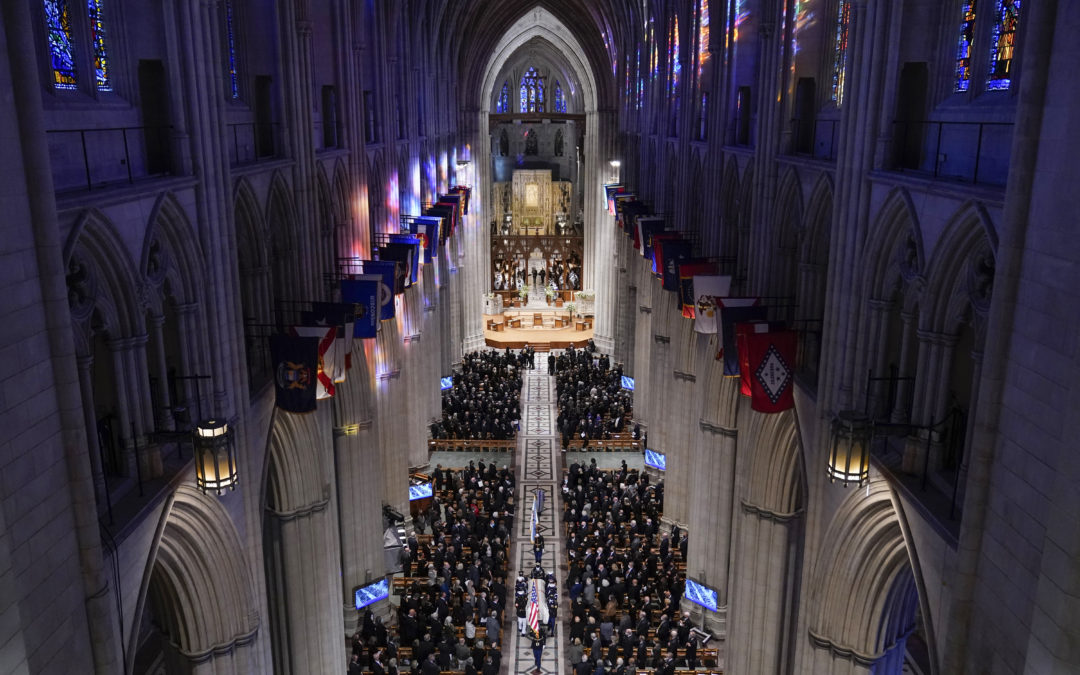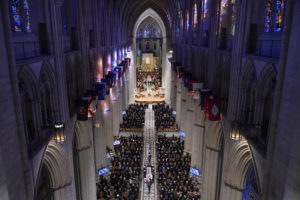
by Mwikali Munyao | Feb 21, 2022 | Headline News, Prayers & Devotionals |
8:1 Then Bildad the Shuhite replied to Job:
2 “How long will you go on like this?
You sound like a blustering wind.
3 Does God twist justice?
Does the Almighty twist what is right?
4 Your children must have sinned against him,
so their punishment was well deserved.
5 But if you pray to God
and seek the favor of the Almighty,
6 and if you are pure and live with integrity,
he will surely rise up and restore your happy home.
7 And though you started with little,
you will end with much.
8 “Just ask the previous generation.
Pay attention to the experience of our ancestors.
9 For we were born but yesterday and know nothing.
Our days on earth are as fleeting as a shadow.
10 But those who came before us will teach you.
They will teach you the wisdom of old.
20 “But look, God will not reject a person of integrity,
nor will he lend a hand to the wicked.
21 He will once again fill your mouth with laughter
and your lips with shouts of joy.
22 Those who hate you will be clothed with shame,
and the home of the wicked will be destroyed.”

In the journey of life, there are moments that will come where life will be difficult. Things will not make sense. It could be a hardship season for you. When those seasons come, it is easy to resort back to a place of fear, second guessing our faith, and wondering if God is really alive.
This scripture Job 8:5-8 reveals the power of prayer while seeking God in those difficult life seasons. What does seeking God look like? How do you seek God in a time of trouble?
- Do not be afraid to ask Him if you need help. A lot of times, there is a sense of guilt or fear wondering whether God can handle your situation. But the reality is seeking Him reveals He cares and acknowledges the effort you make
- Praying and asking for wisdom until you get the assurance that God has heard you. He will provide what you need. Assurance may not automatically come to you in prayer. However, as you seek Him regarding the situation, His peace will manifest that assures you He hears and will attend to you
- Be alert as you pray for the instructions that will accompany the prayers. God may impress on you to forgive an offense, or do something that may not seem relevant to what you are inquiring about in prayer, but obey even if it does not make sense to you in the moment.
You should never judge yourself in your expression of pleading with God in prayer. The posture of pleading should not be misconstrued with begging. If you have been begging God to answer your prayers, your viewpoint of Him may be one of trying to convince Him you are worthy of a breakthrough or an answer. Pleading with God is making an earnest appeal to Him from a posture of faith. Your faith in God’s power and sovereignty pushes you to appeal to Him for your breakthrough.
Pleading often pulls from an established testimony with God. You have seen His power and miraculous grace and you are confident in what He is able to do.
This scripture also reveals the power of knowing the history of God’s work in the world. Finding out what God has done from previous generations, allows us to see the continuous integrity of God’s ability to provide and take care of His own. During a time of need, you may pull on the God of your parents or grand-parents or someone who is dear to you, who has walked with the grace and power of God in such a way that it convinced you of His existence. When you know this beautiful history, it can be used to affirm your faith in the moments you need prayers answered.
I have learned that in this life, there will be trials and tribulations that you will go through. Prayer will make it possible for you to live life with hope. When you get to those seasons, may you be reminded that prayer works, a history with God is powerful, and your faith can give you the confidence to make an appeal for what you need from Him.
He is able to restore you to a prosperous state. That is something you should always desire.

by Allen Reynolds, UrbanFaith Editor | Feb 1, 2022 | Feature, Headline News |
Hear the Word you need when you want it.
UrbanFaith, published by UMI (Urban Ministries, Inc.), has teamed up with HarperCollins Christian Publishing to launch UrbanFaithStudy.com, a subscription-based digital platform with an expanding library of more than 100 video sermons and studies from well-known African American Christian voices. We know it’s hard for young adults to find churches they feel welcomed in and even harder to find leaders they can trust to teach the Word in a way they can hear and understand it. UrbanFaithStudy.com provides the empowering teaching you want that stays faithful while being relevant.
“I am pleased to see this robust and unique platform featuring strong voices and transformative messages by African American pastors and authors,” remarked Jeff Wright, CEO of UMI. “I know it will be a blessing to many people.”
UrbanFaithStudy.com offers culturally relevant, topical sermons delivered by pastors such as Bishop Joseph W. Walker, III; Dr. Dominique Robinson; and husband and wife team Pastor Gabby Cudjoe-Wilkes and Pastor Andrew Wilkes. Bishop Walker is the International Presiding Bishop of the Full Gospel Baptist Church Fellowship and pastor of the historic 30,000-member Mount Zion Baptist Church in Nashville, TN. Dr. Robinson is a religious scholar, theological educator, preacher, writer, activist, and advocate who serves as an assistant professor of preaching at the Seminary of the Southwest in Austin, TX. HBCU and Ivy League-educated pastors Gabby Cudjoe-Wilkes and Andrew Wilkes co-founded the Double Love Experience Church in Brooklyn, NY, a growing congregation of believers committed to the liberating, love-powered ministry of Jesus.
“What an extraordinary opportunity to house digital archives of hope & possibility in the era of a global pandemic, racial reckoning & resilience. It is my prayer that the sermons we offer will help those who hear them know that God has not left them. Even in these times. To share this in partnership with two brands that curate accessible & timely content: UMI & HarperCollins [Christian] is a dream.” – -Pastor Gabby Cudjoe Wilkes
UrbanFaithStudy.com will also launch book study curricula for believers looking for deeper engagement and group study content that engages the church with culturally relevant topics. These curricula are by well-known African American voices, including New York Times bestselling author Jemar Tisby; beloved author and speaker Crystal Evans Hurst; Grammy Award-winning artist Lecrae; and Bible teacher, pastor, and author, Jada Anae Edwards.
“When teaming up with UMI more than a year ago, we knew creating a video platform to host engaging, life-changing biblical content would showcase both organizations’ ability to reach new audiences,” said Mark Schoenwald, president and CEO of HarperCollins Christian Publishing. “The church is evolving, becoming more dependent on technology to deliver sermons, Bible studies, and other curricula. When designing UrbanFaithStudy.com, we used our strengths to achieve more than we could if we had each approached the project separately.”
UrbanFaithStudy.com will serve many consumers, including church congregations, divinity students, young preachers, and individuals seeking to understand how faith informs cultural engagement. The monthly subscription is $5.95 for individuals and $19.95 for churches. To subscribe, visit UrbanFaithStudy.com.
by Jaimie Crumley | Dec 5, 2021 | Headline News |
“Do not neglect to show hospitality to strangers, for by doing that some have entertained angels without knowing it” (Hebrews 13:2, NIV).
Have you ever known someone who never meets a stranger?
Folks who live their lives in such a way that nearly everyone they meet becomes a new friend astound me with their generosity of spirit. I admire their courage and zest for life, which compels them to embrace even those they do not know well, knowing that each creature has gifts to share with the world.
As a faith leader, when I meet folks with those sorts of spirits, I see some of the Spirit of Christ who, although divine, shared meals with the poor, sick, and sinful, laid hands on the infirm, and drew close to the crowds without reservation.
Even in His dying moment, Jesus stretched His arms wide as though embracing all of us and declared forgiveness over us because we did not realize what we were doing. Jesus is the embodiment of the grace of hospitality, and I would argue that hospitality is the biggest gift we, the body of Christ, can offer the world right now.
The Fear Factor
The current social and political climates have caused me to take a step back to examine what Scripture teaches us about welcoming strangers among us. I confess that I focus much of my time concerning myself with the sins that other people perpetrate on each other. I concentrate on the news stories about hate crimes without giving much consideration to the ways that I allow hate and fear to fuel my actions.
The truth is that fear motivates so much of what we do. Our fears prevent us from loving and practicing hospitality in the ways that our faith demands of us. In today’s social media culture, many of us have a fear of rejection. As humans, many of us also have a fear of not knowing which prevents us from meeting new people and having new experiences.
We also often have fears of being powerless that cause us to try to stay in places that make us feel powerful. We allow our fears to impede upon our ability to love.
Before turning outward and critiquing national and international leaders, I want to encourage us, especially during this introspective liturgical season called Lent, to look within to ask ourselves how we are practicing the kind of hospitality that Scripture and the example of Jesus Christ demand of us.
Love Thy Neighbor?
Many of us have learned the classic stories about hospitality in Sunday School and Sunday morning sermons.
We have heard about Abraham and Sarah, who unknowingly hosted angels who foretold the birth of Sarah’s son. In the passage from Hebrews I cited at the top of this article, the author alludes to that passage from Genesis. Despite the many admonitions throughout the Hebrew Bible to care for the foreigner, widow, and orphan, we, like the lawyer in Luke 10, often ask, “Who is my neighbor?”
In response to that question, we have heard Luke’s well-known story of the Good Samaritan who, despite his vastly different culture and faith, cared for an Israelite stranger he found injured on the side of the road. Even after hearing such a dramatic story of sacrificial love, we continue to struggle with caring for our neighbors. Perhaps my favorite aspect of the story is the way it condemns us for the times we fail to show love to people who are just like us.
We have become politically motivated to care for immigrants in recent months, as we should, but we mistreat those who sit right next to us in the pew or who share our offices at work!
Jesus tells Israelite listeners the story of an Israelite man who was robbed as he traveled from Jerusalem to Jericho. A priest passed by and walked on the opposite side of the road to avoid helping. Then, a Levite, a religious leader from the priestly tribe of Levi, passed him. Only a Samaritan, a man who was from a different culture and faith background, cared for the man.
Many commentaries have explained that the priest and the Levite probably did not interact with the victim because of concerns about ritual purity, but does that not cause us to consider our priorities? We cannot prioritize legalism over mercy and love. Here was Jesus, the Lamb of God who takes away the sins of the world, essentially urging His listeners to ritually defile themselves because mercy is at the heart of the Gospel.
The Missing Link
 What the world needs from the church is for us to be the church. The time is now for us to commit ourselves to following Jesus Christ in our actions. It was the way the early Church first began to thrive.
What the world needs from the church is for us to be the church. The time is now for us to commit ourselves to following Jesus Christ in our actions. It was the way the early Church first began to thrive.
As J. Ellsworth Kalas puts it in his book The Story Continues: The Acts of the Apostles for Today, “The Christian church was born in a time and culture when the marketplace of beliefs was crowded to its borders. Religion was everywhere … This meant that it was easy to talk religion, but also that it was difficult for the decision to get serious. No wonder, then, that the followers of Christ were known as ‘people of the Way.’”
The earliest Christians stood out, and they increased in number because they lived their Christianity; for them, it was not simply an interesting intellectual idea. They attracted converts because of their countercultural way of viewing religion as more than a list of philosophies.
Rev. Dr. Martin Luther King Jr. provided a practical understanding of this concept in his sermon “A Knock at Midnight,” which appears in his 1963 book of sermons called Strength to Love. King preached, “The church must be reminded that it is not the master or the servant of the state, but rather the conscience of the state … if the church will free itself from the shackles of a deadening status quo, and, recovering its great historic mission, will speak and act fearlessly and insistently in terms of justice and peace, it will enkindle the imagination of mankind and fire the souls of men, imbuing them with a glowing and ardent love for truth, justice, and peace.”
In other words, from the Scripture we read, to the prayers we pray, to the songs we sing, our worship is real and lived and must transform us from the inside out. The church is not a place to go; the church is a thing to do. We call the physical buildings in which we worship churches, but the church is the body of Christ, at work in the world.
So, what does living our faith teach us about hospitality?
A Place Where Ministry Happens
One of my mentors in ministry began a new pastorate at the end of 2016. After examining the needs and challenges of ministry at her new church, she chose as her theme of her church “Radical Hospitality.” The new framework of thinking about the church as a place where radical hospitality happens has changed it in practical ways in just a few short months.
Church members are beginning to imagine their worship space as first and foremost a place where ministry happens. That sounds obvious, I know, but so many churches have gotten away from thinking of themselves as being ministry spaces above all else.
One of the most drastic changes she has made as pastor has been to reimagine the parsonage, the house that is owned by the church for use by pastors and their families. That house now serves a dual purpose. It is both a “meeting house” where retreats, Bible study, and meetings can occur, and it provides accommodations for the pastor and visiting ministers.
Knowing my colleague, and understanding what it means to be “radical,” I am expecting that in the months and years to come, her new ministry will continue to grow and transform to become more welcoming for all people.
It is our task, as the Samaritan did in the Gospel of Luke, to embrace all we meet. As Hebrews 13:2 reminds us, we do not know the actual identity of those we encounter each day. Scripture teaches us that if we open our hearts to the possibility, each stranger has gifts to share with us that will enhance our lives. My fellow people of the Way, let us go forward with joy to spread Christian hospitality.
Jaimie Crumley is a minister, blogger, podcaster, and ministry consultant. She blogs about race, gender, history, and Christian faith at iamfreeagent.com.
Share your thoughts on ministry and hospitality below.

by C.B. Fletcher, Urban Faith Contributing Writer | Nov 15, 2021 | Headline News, Relationships |
It’s not easy to be hated by the person who is supposed to love you most, and unfortunately, being toxic has become normalized in our culture.
Many see misdirected aggravation, gaslighting, physical abuse, and more as “love tactics.” When a child only knows pain as a source of love, then they too love in that way and any other form of healthy love seems abnormal.
However, the question is, can a person ever love authentically if they were raised to be toxic?
The assumption is no. When someone is exposed to consistent, toxic stress, they are vulnerable to mental and physical illness that can sometimes develop into a genetic trait, according to Hey Sigmund; therefore this behavior is biologically passed on through generations.
However, despite the science behind the effects of toxic love, there is always hope for a better life.
Fighting for Love
 “I just felt like I wasn’t loved by my mom, says Monique, a woman in her 40s who was often told she wasn’t good enough. “I felt growing up in my mom’s house I wasn’t allowed to be me, an individual.”
“I just felt like I wasn’t loved by my mom, says Monique, a woman in her 40s who was often told she wasn’t good enough. “I felt growing up in my mom’s house I wasn’t allowed to be me, an individual.”
To suit her mother’s perfect image of a family, Monique, was to participate in certain activities without any consideration of her talents or desires. While at the same time, her brother was given free reign to participate in activities of his choice throughout their childhood.
And to make matters worse, Monique’s father suffered from Post Traumatic Stress Disorder (PTSD) and would often abuse her. She recalls him touching her to satisfy his physical desires and severely beating her when she reported it to her incredulous mother.
Fortunately, Monique found refuge in her grandmother’s home, where she found the kind of love her mother envied. Monique remembers her mother punishing and verbally abusing her as a result of the love she received from her grandmother.
Like many girls, Monique found herself looking for love in empty relationships during her teen years that lead to a forced, terminated pregnancy and physical and emotional abuse similar to the treatment she received from her own father.
Eventually, Monique met a gentle and caring man named Laz. However, Laz’s compassion and gentleness were unfamiliar to her, which ultimately lead to Monique returning to one of her previous, toxic relationships.
She went on to marry a former flame named Xavier and stayed in her abusive marriage for eight years.
“Towards the end of my [3rd] pregnancy, I found out he was cheating and when I confronted him, he hit me,” says Monique who recalls her toxic relationship that mirrored her childhood. “He asked, ‘Who are you to question me?’…It felt like because of the way I grew up, if I wasn’t getting hit, then it wasn’t love,”
After her divorce, Monique fought against her toxic past. She made the decision to rise above her father’s mental illness, her mother’s jealousy and apathy, and their collective effort to make her their emotional punching bag for their marriage troubles.
Although the struggle did not end after her marriage when it came to love, her children, and health, she remains hopeful enough to fight for the love she deserves. She charges her will to carry on to God, because without Him, she would have taken the final blow to end her suffering.
Turning Off the Gaslight
Bella was born to a Catholic family that rejected her mother for having a baby with a man that she later learned was married. The rejection caused her mother to make multiple attempts to prove her worth to the family by making Bella seem exceptional, but in private her mother was spiteful and unloving as the list of accomplishments grew.
“[My mother] did everything for me to prove herself, but not for the love of me,” Bella explains. “She worked hard to put me through private school and extracurricular activities, but at home I was repeatedly told I was nothing; sometimes she even called me a waste of a human being. To this day, she has never told me she loves me.”
Whenever something would go wrong in Bella’s life, she would automatically blame herself as a result of her relationship with her mother. Even when her husband and father of their two children committed adultery, she took the blame.
As time went on, Bella lost the love of her life, her job, and believed that she would never be loved which drove her into a suicidal state .
Until one day, Bella decided that she had enough and began to fight for her life, beauty, and self-love through therapy. “Once I figured out that I wasn’t this awful, unlovable monster that I was made to believe as a reality by someone who was unloved, it turned my world upside down in a great way,” Bella says. “It never would have happened without me doing the work in therapy.”
As a result of her treatment, Bella was led to a love that she has been enveloped in for the last four years. Even though the pain of rejection transcended through two generations, love won in the end.
“In the middle of all of this, I met a man who just rained love on me,” Bella joyfully exclaims.
Is there hope after a toxic upbringing?
 “But you have this in your favor: You hate the practices of [your abuser], which I also hate” (Revelations 2:6, NIV).
“But you have this in your favor: You hate the practices of [your abuser], which I also hate” (Revelations 2:6, NIV).
In the beginning of this article, the question was, can a person love authentically if they were raised to be toxic? The answer is yes, but you must fight for it.
It is easy to nurse the scars of someone that you love, because love is to be unconditional, right? But what good is unconditional love when a person’s pain has replaced the spirit that you desperately want to love?
That is spiritual warfare and it is best to back away and allow God to handle it if they are unwilling to get help. It is important to recognize the signs of someone who has been abused and trying to regain power, which can include verbally sharing memories of their toxic loved ones.
Fortunately, Bella and Monique worked past those painful memories found a way to defeat them so that the tradition of toxicity ended with them and a reign of love could begin.

by Adelle M. Banks, RNS | Nov 9, 2021 | Commentary, Headline News |
 (RNS) — Former Joint Chiefs of Staff Chairman Colin Powell, known as a four-star general and as a onetime secretary of defense, was remembered at his funeral at the Washington National Cathedral Friday (Nov. 5) as a man of the Episcopal faith.
(RNS) — Former Joint Chiefs of Staff Chairman Colin Powell, known as a four-star general and as a onetime secretary of defense, was remembered at his funeral at the Washington National Cathedral Friday (Nov. 5) as a man of the Episcopal faith.
Longtime colleague and friend Richard Armitage, who served as deputy secretary of state under Powell, recalled how their regular 7 a.m. morning calls shifted to 9:30 on Sunday mornings, after his supervisor had returned from church.
“Colin loved the church: He loved the ceremony. He loved the liturgy. He loved the high hymns, which made him extremely happy,” said Armitage, who served with Powell in the State Department during the George W. Bush administration, during the private ceremony that was livestreamed on YouTube.
“And he would answer the same way every Sunday. He said, ‘Oh yes, I was at church. And I want you to know I’m in the state of grace.’ And I would answer the same way every Sunday: ‘Colin, if you’re not in the state of grace, who among us is?’ And that was every day for almost 40 years, the same opening remarks.”
Powell, who died Oct. 18 from COVID-19 complications, was honored at a nearly two-hour private ceremony. Hundreds of people gathered under the cathedral’s neo-Gothic arches, including President Biden and two former presidents, Barack Obama and George W. Bush, and their wives, and former Secretary of State and first lady Hillary Rodham Clinton.
“With faith in Jesus Christ, we receive the body of our brother Colin Luther Powell for burial,” said Episcopal Church Presiding Bishop Michael Curry, who met the general’s casket at the doors of the cathedral with Bishop Mariann Edgar Budde, leader of the Episcopal Diocese of Washington.
Some family members of Powell, 84, had key roles in the service that mixed the high church liturgy of the cathedral with the military precision of uniformed service members bearing Powell’s coffin and escorting his family.
His son, former Federal Communications Chairman Michael K. Powell, gave a tribute, along with Armitage and former Secretary of State Madeleine Albright, who preceded Powell in that position. His daughter, Annemarie Powell Lyons, read from the Hebrew Bible’s Book of Micah: “And what does the Lord require of you but to do justice, and to love kindness, and to walk humbly with your God?”
The Rev. Stuart A. Kenworthy drew on that Scripture as he spoke of Powell’s faith.
“Colin knew his God through all his years,” said Kenworthy in his homily, a role the former Army National Guard chaplain also played at the 2016 funeral of former first lady Nancy Reagan. “His faith was of first importance, and his life was marked by those words of the Prophet Micah.”
He also encouraged those remembering Powell to embrace their Christian faith.
“God raised Jesus so that you and I might share in his resurrection, and if you turn to him and accept him in faith, he will come into you and raise you into that new and eternal life now,” Kenworthy preached. “Just as he has for your beloved Colin, who now stands upon another shore and in a greater light, with that multitude of saints that no mortal can number.”
Prior to the homily, the Rev. Joshua D. Walters, rector of the Powell family’s church in McLean, Virginia, read words of Jesus from the Gospel of John: “Do not let your hearts be troubled. Believe in God, believe also in me.”
Congregants, masked during the continuing pandemic, stood to sing the hymns “Joyful, Joyful, We Adore Thee” and “Precious Lord.” Soloist Wintley Phipps sang “How Great Thou Art.”
In an earlier statement issued after Powell’s death, Curry noted Powell was a lifelong Episcopalian.
“I pray for his family and all his many loved ones, and I give thanks for his model of integrity, faithful service to our nation and his witness to the impact of a quiet, dignified faith in public life,” the presiding bishop said at the time. “He cared about people deeply. He served his country and humanity nobly. He loved his family and his God unswervingly.”
Though not generally known for his ties to religion, Powell was noted for comments he once made about then-Senator Obama’s faith.
Obama, in a statement released on the day of Powell’s death, spoke of his deep appreciation of Powell’s endorsement of his presidential candidacy when the general had been affiliated with past Republican administrations.
“At a time when conspiracy theories were swirling, with some questioning my faith, General Powell took the opportunity to get to the heart of the matter in a way only he could,” said Obama in the statement, referring to rumors that he was a Muslim.
At the time, Powell said, “The correct answer is, he is not a Muslim; he’s a Christian.”
But then Powell added a follow-up: “But the really right answer is, ‘What if he is?’ Is there something wrong with being a Muslim in this country? The answer’s no, that’s not America. Is there something wrong with some 7-year-old Muslim-American kid believing that he or she could be president?”
Powell also was among the top picks of likely voters who were religious and considering potential vice presidents when the then-senator was seeking the presidency in 2008.
But Armitage and other speakers mostly put politics aside as they recalled the man who was their friend, family member or colleague.
The former deputy secretary of state noted he and Powell had different preferences for hymns. Armitage recited the final verse of “Rough Side of the Mountain,” which speaks of standing “before God’s throne” when the race of life has concluded.
“Be real quiet,” Armitage told the congregation. “Listen real carefully. And you might hear our savior say, ‘Colin, welcome home. And here’s your starry crown.'”




 What the world needs from the church is for us to be the church. The time is now for us to commit ourselves to following Jesus Christ in our actions. It was the way the early Church first began to thrive.
What the world needs from the church is for us to be the church. The time is now for us to commit ourselves to following Jesus Christ in our actions. It was the way the early Church first began to thrive.
 “I just felt like I wasn’t loved by my mom, says Monique, a woman in her 40s who was often told she wasn’t good enough. “I felt growing up in my mom’s house I wasn’t allowed to be me, an individual.”
“I just felt like I wasn’t loved by my mom, says Monique, a woman in her 40s who was often told she wasn’t good enough. “I felt growing up in my mom’s house I wasn’t allowed to be me, an individual.” “But you have this in your favor: You hate the practices of [your abuser], which I also hate” (
“But you have this in your favor: You hate the practices of [your abuser], which I also hate” (
 (RNS) — Former Joint Chiefs of Staff Chairman Colin Powell, known as a four-star general and as a onetime secretary of defense, was remembered at his funeral at the Washington National Cathedral Friday (Nov. 5) as a man of the Episcopal faith.
(RNS) — Former Joint Chiefs of Staff Chairman Colin Powell, known as a four-star general and as a onetime secretary of defense, was remembered at his funeral at the Washington National Cathedral Friday (Nov. 5) as a man of the Episcopal faith.